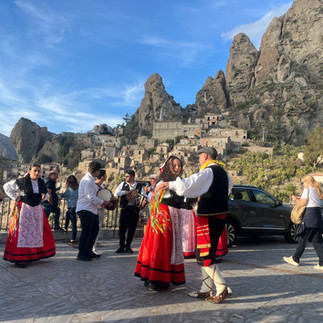A Greek in Calabria
- katharinaaronis

- Jun 13, 2025
- 5 min read
Why is there a Center for Greek Language and Culture in Calabria? In the interview with Vasiliki Vourda, I learn what motivated her to found the center "Ellinomatheia," what her work as a tour guide in Calabria is like, and what dreams she has for Calabrias future and its Greek culture.

In antiquity, Greek tribes established colonies in Calabria, and the ties with the so-called "Magna Graecia" — as the Greek world of antiquity in the Mediterranean was called — remain strong and tangible to this day. Anyone who visits the Greek-speaking villages gets the feeling of being transported to another place, another time. That’s exactly how I felt, as did the thousands of visitors who travel every year from Greece and Cyprus to Calabria, aiming to discover these unique cultural and linguistic ties. More will follow in upcoming articles about Reggio Calabria and the villages of Gallicciano, Pentadattilo, and Bova.
When and why did you first come to Calabria? Do you miss anything from Greece?
I first came to Calabria at Easter in 1992, when I was an Erasmus student in Pisa and my roommate was from Reggio. She invited me to spend the Easter holidays with her family, and that’s how I got to know Greek-speaking Calabria. I even have an early historic photo in the village of Pentadatktylo, which made a great impression on me. I’ve been living here permanently since 2001, the year I decided to leave Athens for southern Italy. I have never regretted it at all — it was a conscious life decision. I am happy here with my family, my husband, and my two children, who have now grown up and learned to have two homelands, just like me.What I miss from Greece, besides my family and friends, is my father’s village, which I love very much — Ellinopyrgos in Karditsa.
What is your job as a tour guide like?
The job of a tour guide is particularly demanding, as I am called not only to guide people through various sights, museums, cities, etc., but also to make sure that all members of this very special travel family, which forms for a few days, have a good time! It is a great responsibility to have the opportunity to plan people’s vacations. It is a significant matter to share your knowledge, but even more important to care for every aspect of the experience that is called group travel.
You work closely with Greek and Cypriot travel agencies. What are the visitors’ reactions when they learn about Magna Graecia and Calabria in general?
The people who visit Magna Graecia are individuals with a good to excellent knowledge of its history. They have consciously chosen this trip; they are not influenced by trends or advertisements but come to see and learn, driven by a well-meaning curiosity: “Do they really still speak Greek?” “What exactly is this Magna Graecia?”Of course, everyone who travels with me to the Greek-speaking villages leaves moved and fascinated by the “discovery” of another Greece — a culture that endures over time and the sweeping forces of globalization, thanks to its deeply rooted values.
From left: A group of travelers visits the famous Bronzi di Riace statues in Reggio Calabria // Welcome to Gallicianò, or as they say here: Kalos irthete // A Greek travel group in Taormina, Sicily
How would you describe Calabria to someone who doesn’t know it? And why is it worth getting to know?
Calabria is one of the “Greek” regions of Southern Italy. It has all the good and bad aspects of our country — natural beauty, history, traditions, hospitable people, excellent cuisine… but it also faces major problems that have troubled it for years and prevent it from becoming a tourist destination on the level of Tuscany or Apulia.
What needs to be done to better promote Calabria?
To achieve this, airline connections alone are not enough. Infrastructure, hotels, organized beaches, a good road network, and trained, specialized personnel in all areas of hospitality and reception are needed. In my own field, for example, there is a big problem due to the lack of licensed tour guides, caused by huge gaps in Italian legislation, which has yet to resolve the issue of a legal framework for conducting the necessary exams.
The "Ellinomathia" Center, images 1 and 2, is now officially certified to issue the Greek Language Certificate of the University of Thessaloniki. In the right image, a cultural event with traditional Calabrian dances in the Greek-speaking village of Pentadatktylo, performed by the association "La Ginestra."
Why did you decide to open the Ellinomathia Center? Where is the Center 10 years after its founding?
My professional life in Calabria has been, since my earliest years here, a continuous search for connection with Greece—initially subconsciously, but ever since becoming a tour guide, completely consciously. When I founded the Center for Greek Language and Culture "Ellinomathia" 10 years ago, I did so initially to support the teaching of Modern Greek at the Dante Alighieri University of Reggio Calabria, with which I had just begun collaborating as a teacher at the Foreign Language Center. The university needed an external partner to manage the financial side of the Ellinomathia Certification Exam Center, and thus the namesake Center was established. As it turned out, this was only the starting point, since very soon the Center evolved into a point of reference not only for the city’s residents but also for Greek schools, universities, travel agencies, associations, and clubs from Greece and Cyprus mainly, seeking a local organization.Thus, within a few years, with the support of members and friends, we managed to carry out not only teaching programs in Modern and Ancient Greek but also seminars on traditional dances, ancient drama, screenings of Greek films, book presentations, guided tours, twinning projects, excursions, programs promoting reading and history in primary schools, and much more.
Some of the activities and initiatives undertaken by the Ellinomathia Center during its first ten years were supported by sponsors who helped us survive the difficult pandemic years and continue to grow.
What is your dream for the Ellinomathia Center and for Calabria?
For the future, I would like the Center to become a vibrant and active organization, connected with Greek and other universities, state and private institutions, associations, and other bodies, so that we can join forces toward the same direction. We have already initiated this new era with our participation in the Common Cultural Doctrine of Greece, Cyprus, and the worldwide Greek diaspora, “The Communities of the Greeks,” an important effort that will soon come to fruition starting in Cyprus, where the founding conference will take place in November 2025. At least 25 associations are already founding members, and this is only the beginning... We have big and ambitious dreams to create a reunification of the Greek world with the common denominator of our culture and language—our greatest and most precious treasure.
On these indisputable foundations, we dream of building a new “country” of Greeks everywhere, where the timeless values of Greek education and spirit will have the place and role they deserve.
Thank you very much, Vasiliki, for sharing these fascinating aspects of your work! I’m glad I discovered this Greek part of Calabria and look forward to learning more and collaborating again soon!
Follow Vasiliki here: https://www.facebook.com/centroellinomatheia https://www.facebook.com/vasiliki.vourda https://www.instagram.com/centro_ellinomatheia10/

















Comments